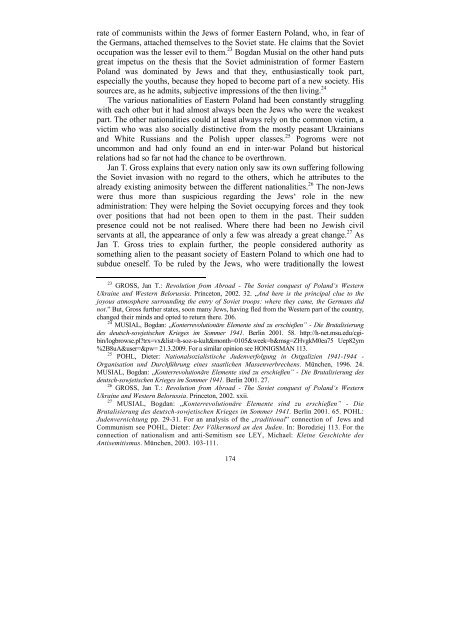The Molotov-Ribbentrop Pact - ELTE BTK Történelem Szakos Portál
The Molotov-Ribbentrop Pact - ELTE BTK Történelem Szakos Portál
The Molotov-Ribbentrop Pact - ELTE BTK Történelem Szakos Portál
Create successful ePaper yourself
Turn your PDF publications into a flip-book with our unique Google optimized e-Paper software.
ate of communists within the Jews of former Eastern Poland, who, in fear of<br />
the Germans, attached themselves to the Soviet state. He claims that the Soviet<br />
occupation was the lesser evil to them. 23 Bogdan Musial on the other hand puts<br />
great impetus on the thesis that the Soviet administration of former Eastern<br />
Poland was dominated by Jews and that they, enthusiastically took part,<br />
especially the youths, because they hoped to become part of a new society. His<br />
sources are, as he admits, subjective impressions of the then living. 24<br />
<strong>The</strong> various nationalities of Eastern Poland had been constantly struggling<br />
with each other but it had almost always been the Jews who were the weakest<br />
part. <strong>The</strong> other nationalities could at least always rely on the common victim, a<br />
victim who was also socially distinctive from the mostly peasant Ukrainians<br />
and White Russians and the Polish upper classes. 25 Pogroms were not<br />
uncommon and had only found an end in inter-war Poland but historical<br />
relations had so far not had the chance to be overthrown.<br />
Jan T. Gross explains that every nation only saw its own suffering following<br />
the Soviet invasion with no regard to the others, which he attributes to the<br />
already existing animosity between the different nationalities. 26 <strong>The</strong> non-Jews<br />
were thus more than suspicious regarding the Jews‘ role in the new<br />
administration: <strong>The</strong>y were helping the Soviet occupying forces and they took<br />
over positions that had not been open to them in the past. <strong>The</strong>ir sudden<br />
presence could not be not realised. Where there had been no Jewish civil<br />
servants at all, the appearance of only a few was already a great change. 27 As<br />
Jan T. Gross tries to explain further, the people considered authority as<br />
something alien to the peasant society of Eastern Poland to which one had to<br />
subdue oneself. To be ruled by the Jews, who were traditionally the lowest<br />
23 GROSS, Jan T.: Revolution from Abroad - <strong>The</strong> Soviet conquest of Poland‘s Western<br />
Ukraine and Western Belorussia. Princeton, 2002. 32. „And here is the principal clue to the<br />
joyous atmosphere surrounding the entry of Soviet troops: where they came, the Germans did<br />
not.” But, Gross further states, soon many Jews, having fled from the Western part of the country,<br />
changed their minds and opted to return there. 206.<br />
24 MUSIAL, Bogdan: „Konterrevolutionäre Elemente sind zu erschießen” - Die Brutalisierung<br />
des deutsch-sowjetischen Krieges im Sommer 1941. Berlin 2001. 58. http://h-net.msu.edu/cgibin/logbrowse.pl?trx=vx&list=h-soz-u-kult&month=0105&week=b&msg=ZHvgkM0ea75<br />
Uep82ym<br />
%2B8uA&user=&pw= 21.3.2009. For a similar opinion see HONIGSMAN 113.<br />
25 POHL, Dieter: Nationalsozialistische Judenverfolgung in Ostgalizien 1941-1944 -<br />
Organisation und Durchführung eines staatlichen Massenverbrechens. München, 1996. 24.<br />
MUSIAL, Bogdan: „Konterrevolutionäre Elemente sind zu erschießen” - Die Brutalisierung des<br />
deutsch-sowjetischen Krieges im Sommer 1941. Berlin 2001. 27.<br />
26 GROSS, Jan T.: Revolution from Abroad - <strong>The</strong> Soviet conquest of Poland‘s Western<br />
Ukraine and Western Belorussia. Princeton, 2002. xxii.<br />
27 MUSIAL, Bogdan: „Konterrevolutionäre Elemente sind zu erschießen” - Die<br />
Brutalisierung des deutsch-sowjetischen Krieges im Sommer 1941. Berlin 2001. 65. POHL:<br />
Judenvernichtung pp. 29-31. For an analysis of the „traditional” connection of Jews and<br />
Communism see POHL, Dieter: Der Völkermord an den Juden. In: Borodziej 113. For the<br />
connection of nationalism and anti-Semitism see LEY, Michael: Kleine Geschichte des<br />
Antisemitismus. München, 2003. 103-111.<br />
174













